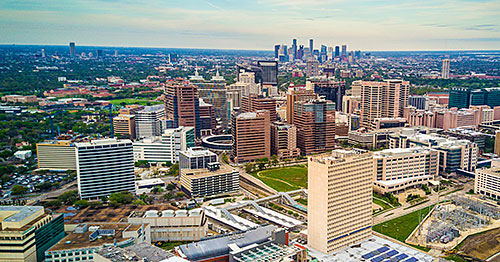Houston has been the country’s fastest growing metro since 2010. How has your economy and industry changed alongside that population growth?
Really, over the last two decades, there has been a remarkable transformation in Houston. Today, we are a vibrant, global city, drawing talented people and cutting-edge businesses from across the globe. It may surprise people, but we are America’s most diverse city, where one in four of our residents was born outside of the U.S.With a regional gross domestic product (GDP) of over $490 billion, Houston is the nation’s seventh-largest metro economy. Incredibly, 17 percent of our GDP is tied to exports — this is the highest of any U.S. metro.
The region offers a business-friendly, growth-driven market with a low cost of doing business and the lowest cost of living among major U.S. metros. With a regional gross domestic product (GDP) of over $490 billion, Houston is the nation’s seventh-largest metro economy. Incredibly, 17 percent of our GDP is tied to exports — this is the highest of any U.S. metro. Much of this success is driven by the region’s global connections and our deep bench of STEM and corporate talent.
Houston is known by many as the Energy Capital of the World. How are you adapting to the global energy transition from fossil fuels to other sources of energy?
First, it is important to note that global energy demand forecasts show we will continue to need more energy year after year for decades to come. The question is, how do we, as a global community, transition to a lower carbon world while meeting the demand for energy in a cost-effective and responsible fashion?
As the headquarters and intellectual capital for virtually every segment of the global energy industry, Houston companies are well-positioned to help lead the transition. This includes a growing focus on renewables and energy technology. The region is also poised to lead in the area of carbon capture use and storage, leveraging our expertise and infrastructure to help decarbonize the industrial sector and deliver negative emissions at the scale required to make a difference to the global climate.

Beyond energy, Houston is home to the world’s largest “medical city,” the Texas Medical Center. How has that helped drive the diversification of Houston’s economy?
The Texas Medical Center is a 1,345-acre medical city that houses the largest collection of healthcare and life science institutions in the world. A hub for medical device manufacturing, pharmaceuticals and health research, Houston is home to more than 1,760 life sciences companies, cutting-edge health care facilities and research institutions. These unique strengths landed the region the number two spot in CBRE’s list of emerging life sciences clusters. With the much anticipated TMC3 project, a massive collaborative life sciences commercialization campus bringing together leaders in life science in one space, Houston will solidify its position as the Third Coast for Life Sciences.
Houston is home to more than 1,760 life sciences companies, cutting-edge health care facilities and research institutions. These unique strengths landed the region the number two spot in CBRE’s list of emerging life sciences clusters.What is Houston doing to grow its digital tech ecosystem? How is that connected to your key industries?
As our core industries like energy, life sciences, manufacturing, logistics and aerospace digitize, the region has become a hotbed of rapid technological development thanks to our ability to offer tech companies access to customers and talent with core industry expertise.
Houston has seen several significant wins in its innovation landscape in just the last few years, including July’s groundbreaking of The Ion. Anchoring the 16-acre South Main Innovation District in Midtown, the 270,000-square-foot innovation hub will bring together entrepreneurs, venture capital, corporations and academia to collaborate under one roof. The broader district sits at the midpoint of Houston’s Innovation Corridor, a key piece of the city’s growing innovation ecosystem that runs four miles through the heart of Houston.
Houston has also added dozens of startup development organizations (SDOs) to our innovation ecosystem, such as Plug and Play Technology Center, MassChallenge and Gener8tor. These major projects are part of a greater momentum and collaboration that is energizing our innovation ecosystem and attracting more technology companies and venture capital to the region.
Today, Houston is home to over 500 digital technology companies and over 8,200 companies in technology-related industries. Notable players include Hewlett Packard Enterprises, Oracle, Amazon Web Services (AWS), Microsoft, IBM, Alert Logic, and BMC. Houston’s technology sector employs more than 233,000 professionals and has a $26.6 billion impact on the local economy.

Houston is one of the largest private equity investment markets in the U.S., largely driven by the billions invested in energy ventures each year. In recent years, venture capital has gained a strong foothold, especially in life science and digital technology.
Houston is on pace for a record-setting year for venture capital investment ranking in the Top 20 U.S. metros for venture capital funding – ahead of emerging tech cities like Detroit, Cincinnati and Pittsburgh. Corporate venture capital is an especially strong growth area for Houston. Corporations making venture capital investments out of Houston have invested $5.1 billion since ’17, twice the amount invested from Austin and four times the amount from Dallas.
